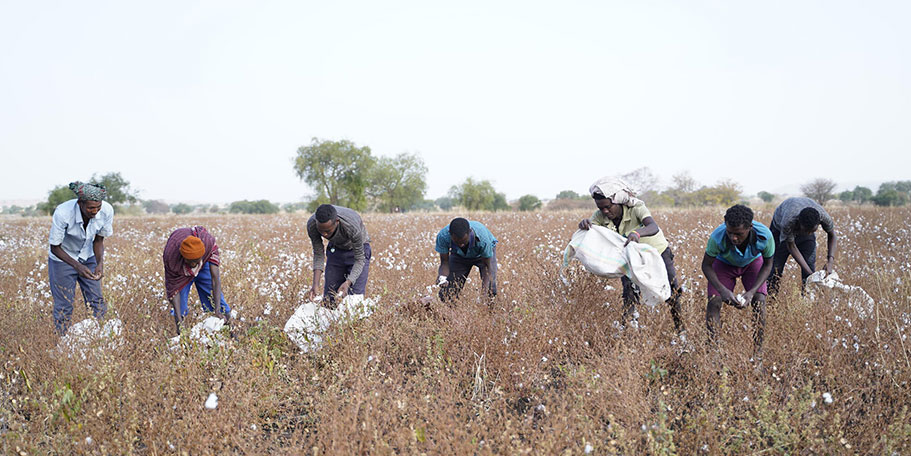
The prized sesame fields of the contested Western Tigray—currently under the control of Amhara regional forces—have become the latest battleground in Ethiopia’s multi-layered conflict, as powerful political, economic, and military actors compete over access to the region’s lucrative agricultural output.
Evidence cited by a report published The Sentry, a US-based non-governmental organization that specializes in investigations into violent conflict and kleptocracy, last month and a Chatham House publication dated May 2024 reveal that shipments of sesame from Amhara-held Welkait to Eritrea have served as payment for military training and support provided by the Eritrean Defence Forces (EDF) to Amhara militias, notably the Fano.
This arrangement has allowed Eritrean actors to dictate trade terms that heavily favor their side, bypassing Ethiopian federal authorities, according to the reports.
As of April 2025—the Eritrean Defense Force (EDF) is also reported to be involved in the lucrative trade in sesame, referred to as “white gold” in The Sentry’s report.
The report corroborates research conducted in 2022 that found that “illegal sesame trading is surging, with sesame from Tigray winding its way to the markets of neighbouring Eritrea without passing through customs authorities.”
– Advertisement –
The same report also stated that it has found that “sesame profits from illegal trading grease the hands of those who provide security, finance, or permissions along the chain from production to market.”
The Chatham House publication posits that competition over control of sesame revenues has reshaped local agricultural markets, and provided a strategic motivation for conflict participants and members of political and economic elites. If left unaddressed, these shifts threaten to prolong and intensify conflict and worsen the inequalities faced by people living in the border regions, it warns.
The report explains how the sesame industry is connected to, and interacts with, both internal and transnational conflict dynamics affecting Ethiopia and Sudan. It warns that the scramble for sesame profits has transformed the crop into a conflict commodity, entrenching ethnic tensions, deepening political fragmentation, and drawing in transnational players such as Eritrean forces.
Western Tigray, also known as Welkait, is a contested region that changed hands during the 2020–2022 civil war. Since then, Amhara forces have maintained control of a territory hardliners claim was seized by Tigray 30 years ago, after the ethnic coalition dominated by the Tigray People’s Liberation Front (TPLF) came to power.
This earlier assimilation of territories into Tigray, which Amhara has sought to reverse, allegedly occurred without the consent of local people and has been a source of hostility between Amhara and Tigrayan nationalists since the early 1990s. Since late 2020 the contested territories have been under Amhara control, although both sides continue to claim them.
According to the report, competition over the sesame sector and for control of land has reinforced ethnic and political fragmentation.
“Before the war, the sesame and wider agricultural sector in Western Tigray/Welkait had been dominated by Tigrayan business interests, through the TPLF’s business conglomerate, the Endowment Fund for the Rehabilitation of Tigray (EFFORT), and its subsidiary, Hiwot Agricultural Mechanization PLC. The transportation and export of sesame were facilitated by Guna Trading and Trans Ethiopia, both also belonging to EFFORT,” it reads.
The publication asserted that much of the sesame farmed in Welkait and Humera is now exported through channels outside of the formal ECX mechanism,which has led to the sector becoming increasingly securitized and unregulated.
The current political instability in Amhara state has also been cited as further exacerbating this trend towards informal and or contraband trade.
“The formal sector (including producers, buyers and exporters) is heavily controlled by brokers who also regulate the sale of sesame outside formal channels via a complex transnational supply chain,” it reads.
According to the report, the brokers often lend money to local farmers if the farmers cannot afford to pay daily labourers or buy agricultural inputs. In this way, the brokers maintain an advantage in the market, as farmers caught up in such arrangements are then obliged to sell their crops to the brokers that have provided loans.
Informal trade takes place across multiple borders and occurs despite ad hoc infrastructure and inconvenient border impediments, noted the report.
“Smuggling is driven in part by the fact that official state policies on trade are often impractical and restrictive. It is also often a necessity due to the lack of alternative livelihood options, and this way of life has emerged as part of the accepted cultural fabric of borderland communities,” it reads.
Meanwhile, instability in neighboring Sudan and renewed tensions with Eritrea further complicate Ethiopia’s position. Cross-border smuggling, often outside the purview of federal oversight, has raised alarms in Khartoum and Asmara, particularly amid fears that borderland militias could act as proxies in larger geopolitical disputes.
Federal officials in Addis Ababa have yet to announce a roadmap for resolving the status of Western Tigray, though the Pretoria Agreement calls for the issue to be settled constitutionally.
Any move to implement a referendum or form a neutral interim administration could reignite hostilities between Tigrayan and Amhara factions, observers warn.
With Ethiopia’s peace process hanging in the balance, analysts say that ignoring the economic undercurrents of the conflict—especially in high-stakes sectors like sesame—risks undermining long-term stability in the region.
.
.
.
#White #Gold #Sesame #Rush #Fuels #Strained #Tensions #Contested #Western #Tigray
Source link











